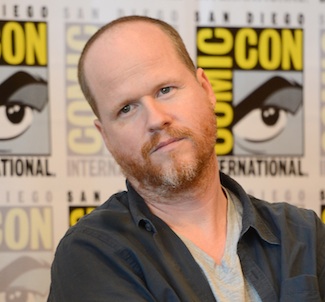
“We are watching capitalism destroy itself right now,” [Whedon] told the audience.
He added that America is “turning into Tsarist Russia” and that “we’re creating a country of serfs.”
Whedon was raised on the Upper Westside neighborhood of Manhattan in the 1970s, an area associated with left-leaning intellectuals. He said he was raised by people who thought socialism was a ”beautiful concept.”
Socialism remains a taboo word in American politics, as Republicans congressmen raise the specter of the Cold War. They refer to many Obama administration initatives as socialist, and the same goes for most laws that advocate increasing spending on social welfare programs. They also refer to the President as a socialist, though this and many of their other claims misuse the term.
This evidently frustrates Whedon, who traces this development to Ronald Reagan[.]
We have people trying to create structures and preserve the structures that will help the middle and working class, and people calling them socialists,” Whedon said. “It’s not Republican or Democrat, conservative or liberal […] it’s some people with some sense of dignity and people who have gone off the reservation.”
Whedon obviously can’t tell the difference between laissez-faire capitalism (i.e., free markets) and the state-regulated capitalism we have today. Or the difference between democratic corporatism and tyrannical absolute monarchy. As with most on the left, he directs his criticisms almost exclusively at the market and big corporations.
To the extent that leftists criticize government, it is mainly to indict a particular White House administration or the existing crop of Congressmen for allowing themselves to be corrupted by Big Business, not the state as such. If only we could get the “right people” (read: Democrats) into power and eliminate corporate personhood, they think, benevolent government will be restored and all will be rosy again. Nevermind that the Democratic politicians, including Obama, are a bunch of corporatists too. Nevermind that corporations would still exist and influence politics without state-granted personhood and limited liability.2
To think Joss Whedon won a Prometheus Special Award in 2006 for Serenity…
But in Serenity the main villain was, properly and refreshingly, a tyrannical government.

If leftists like Whedon truly want to eliminate corporate influence in politics and help the poor and middle class, they should direct their ire at the state itself. The state is not inherently benevolent. The state is the great enabler of corporate evil. It is the state that enacts and enforces laws and regulations, often at the behest of the big corporations themselves, that have the effect of oligopolizing the market, entrenching the status quo, and squelching competition. It is the state that all too frequently sides with corporations, helping them get away with practices they otherwise would not be able to get away with.
To end corporate influence in politics and break any undue power corporations have in the market, the only viable solution is a complete separation of economy and state. Government intervention in the economy must be eliminated entirely. Only when the state lacks the power to do anything to help or hurt corporations will they lose the incentive to influence it to their advantage. To accomplish this, however, the state itself must be abolished. It will never be enough to get the “right people” into power or impose new constitutional limits on the state. The nature of the state is such that the worst among us rise to the top and constitutional limits inevitably prove ineffective and are even subverted to justify more power.
















Comments on this entry are closed.
Eric Blitz July 15, 2012 @ 9:04 am | Link
Your main points are correct. However, I do agree with Whedon on one point which you don’t really address. Calling President Obama a socialist is an abuse of the term. To fit, he’d have to be seeking to nationalize major components of the means of production and greatly restrict private property rights. His policies socialize, no doubt. They are collectivist, no doubt. But it is sufficient to call him a left-wing social democrat as a pejorative in political rhetoric. At least then you’d be accurate.
And to quibble in the deep weeds, your note 2 should consider that third parties cannot voluntarily consent to limited liability of associative ownership when that liability arises out of tort, only contract. If ABC corporation runs Mark down on the street driving their truck with negligently maintained brakes which are the proximate cause of incident leading to injury, Mark did not consent to limited liability. Any protective association mechanism you can come up with requires monopolistic control of geographical areas by one or more protective associations to impose such a result, which is qualitatively no different than the monopoly claim on the use of force of a state.
Geoffrey Allan Plauché July 15, 2012 @ 9:35 am | Link
Thanks for ccommenting, Eric.
Re: the socialist epithet, I agree.
As for limited liability, it only protects shareholders, not the companies or management themselves, so in your example of negligence they can be held legally responsible. I don’t see libertarian courts holding shareholders responsible.
You’d have to come up with some kind of theory of vicarious liability that would ensnare shareholders without having absurd consequences and that libertarian courts would accept, and I just don’t think one is possible. Consider that shareholders have little or no say in how a company is run. Most also have not invested any money in the company; they paid someone else for the share that they own, not the company itself (it’s like used book selling). See Stephan Kinsella’s post “Corporate Personhood, Limited Liability, and Double Taxation” in The libertarian Standard.
Eric Blitz July 15, 2012 @ 11:15 am | Link
Geoffrey, I recall reading that thread. It is indeed an excellent discussion on that topic. I understand the arguments, and I think the vicarious liability argument is strong. However, I am not yet convinced that libertarian objections to vicarious liability, such as respondeat superior, are necessary libertarian propositions rather than favored (by some).
Vicarious liability recognizes that property ownership includes a bundle of responsibilities flowing from said ownership. If I own real property and my property is used in a way that hurts a third party’s property or life (I use it to pollute beyond my property line, for example), I may not have been the polluter (say a lessee undertook the acts), yet my property became the instrumentality of the injury and I allowed it to do so. You can engineer many examples of property being used to harm innocent third parties, for which the law can impose liability. In fact, most libertarians accept that using one’s property to cause injury is a proper mechanism for establishing liability against the individual, as the property may have insufficient value for compensation and the exclusive nature of dominion and control over the property by the owner (assuming a libertarian view of property rights) justifies that property being viewed, for liability reasons, as an instrumentality of the individual owner. The reason I chose the ‘failure to maintain the brakes’ example is that the liability arises not from the specific act of negligence that causes the accident (poor driving) but arises from the responsibilities of ownership of the vehicle.
Ownership of the equity in an entity (such as a corporation or limited liability company) established by law to be recognized as legally independent of its owners (a fiction, but nonetheless a useful legal fiction) is arguably no different. It is an instrumentality of the owners and a property interest which can be said to carry responsibilities attendant to ownership.
I don’t deny that there are good arguments in favor of limited liability for equity owners, I am just not yet convinced that they don’t involve a form of coercion as against innocent third-parties, whether obtained through a state or other form of association imposing a rule of law.
Vangel Vesovski July 21, 2012 @ 9:10 pm | Link
Obama looks a lot like a National Socialist type to me. He believes in government control of industry and government/industry partnerships that harm both consumers and investors. From a distance he may sound like Fidel but up close he looks a lot like Il Duce.